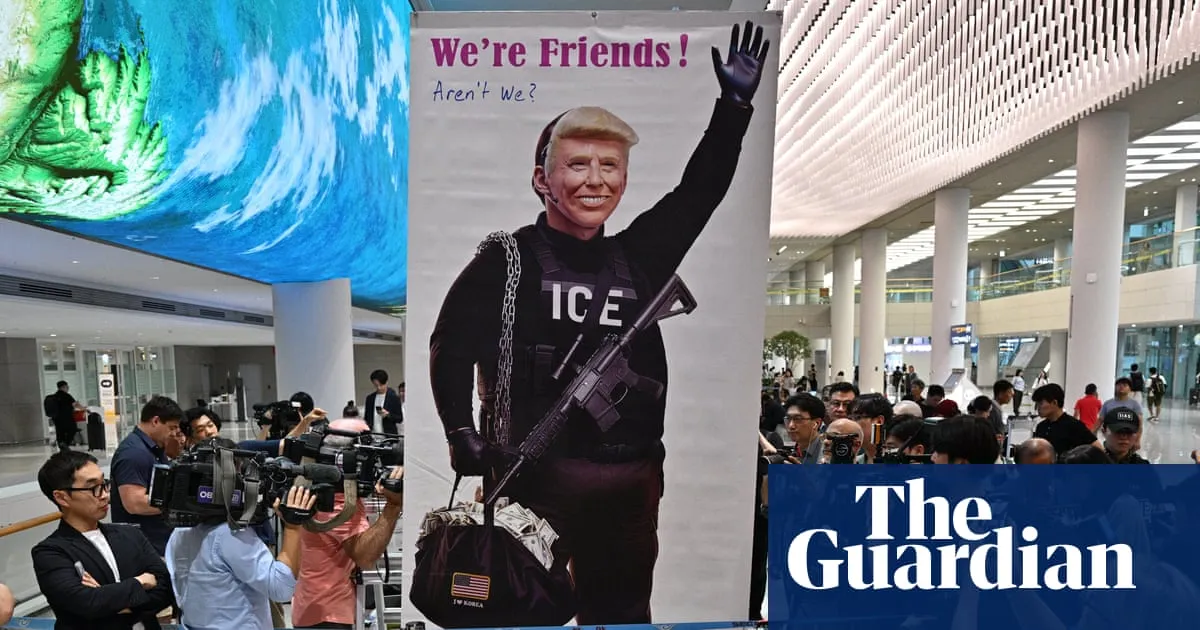
More than 300 South Korean workers arrived at Incheon International Airport on Friday afternoon, concluding a week-long ordeal that began with the largest single-site raid by the US Department of Homeland Security. This operation, carried out by Immigration and Customs Enforcement (ICE) agents, has sparked significant unrest in South Korea, raising questions about the reliability of its closest ally.
The 316 Koreans, accompanied by 14 workers from other nationalities, landed shortly after 3 PM local time on a chartered Korean Air flight. They had been detained since September 4 at a Hyundai-LG battery plant construction site in Georgia. The situation has incited widespread anger across the political spectrum in South Korea, with one newspaper likening the treatment of these workers to that of “prisoners of war.” Another publication noted that many Koreans felt betrayed by their ally.
Upon their return, the workers requested privacy as they emerged in small groups to board waiting buses. Most wore face masks and carried only small bags, visibly exhausted but relieved that their ordeal had come to an end. Addressing reporters, the presidential chief of staff, Kang Hoon-sik, expressed his regret over the situation. “We did our best, but I’m sorry we couldn’t bring them back to their homeland sooner,” he stated. He emphasized that the relationship with the United States is evolving, saying, “We’re in an age of new normal in dealing with the United States.”
The detained workers were part of a crucial project involving a $4.3 billion battery plant, vital to Hyundai’s ambitions for electric vehicles in the US. Most of the workers were employed by LG Energy Solution or its subcontractors. The detention arose from the workers using B1 business visas and the 90-day visa waiver program (ESTA) for activities that US authorities deemed as actual employment, rather than permitted activities such as meetings or training. This longstanding practice, referred to as a “grey zone,” had been largely overlooked by previous US administrations.
The South Korean president, Lee Jae Myung, issued a stern warning to Washington, indicating that Korean businesses may “hesitate to make direct investments” if visa issues are not resolved swiftly. He asserted, “Korean businesses that have entered the United States are likely in a state of serious bewilderment.” Lee highlighted the necessity of skilled workers to establish facilities and install machinery, stating, “The US doesn’t have such personnel, and they won’t give visas for our workers to stay and work.”
The workers' departure from Georgia was originally delayed by a day after former President Donald Trump offered them the option to stay and train Americans, but only one worker chose to remain. In response to the escalating tensions, South Korea's foreign minister, Cho Hyun, traveled to the US to meet with his counterpart, Marco Rubio, securing assurances that the workers would not face further restrictions during their transport. This concession was significant, particularly after ICE released footage showing Korean workers being led away in chains, which evoked painful historical memories of subjugation.
The episode has triggered unprecedented public outrage, with a survey conducted by local broadcaster MBC revealing that 68% of respondents felt the US government “did not show consideration for South Korea as an ally.” Media reactions in South Korea have been scathing, with the Seoul Economic Daily describing the workers’ treatment as akin to that of “prisoners of war.” The conservative Chosun Ilbo labeled the operation a “merciless arrest,” representing a significant “breach of trust,” while the progressive Hankyoreh questioned: “Is this what you do to an ally?” Many Koreans felt “backstabbed” following Lee’s recent meeting with Trump.
At the airport, a 75-year-old protester, Hong Jung-sik, encapsulated the nation’s anger, expressing feelings of betrayal over the detention of his fellow citizens. “Trump, who do you think you are?” he shouted, branding the incident a “national humiliation” and “evil behavior.” This incident underscores the fragility of international relations and the importance of diplomatic sensitivity between allies.